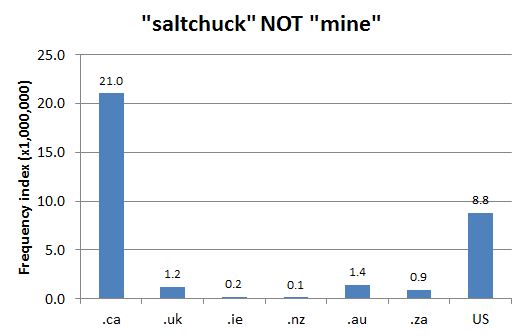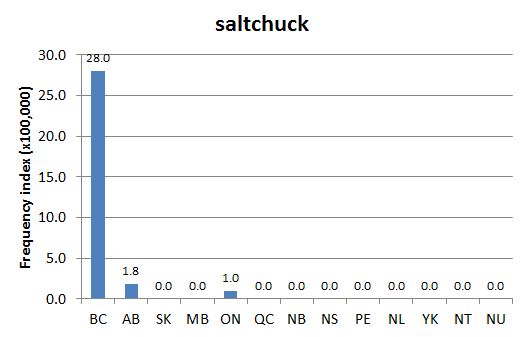DCHP-2
saltchuck salt chuck, salt-chuck, Salt Chuck, Salt-Chuck [< blend of English 'salt' and Nootka 'water'] DCHP-2 (December 2016)
n. — British Columbia, now quite rare
the ocean or seawater, including tidal areas and channels.
Type: 1. Origin — The term was borrowed from Chinook Jargon, a contact language developed to facilitate trade along the west coast and used from the early 19th to the mid 20th century (see the 1889 and 1981 quotations, see Canadian Encyclopedia reference, but see the 2015 quotation for relic speakers). Although the term is also found in the US Pacific Northwest, saltchuck is most prevalent in Canada (see Chart 1). DARE (s.v. "saltchuck") dates its earliest attestations to 1868 and 1899.
Gregg (1995: 185) describes saltchuck as a "hybrid compound", combining the English "salt" with the Nootka "ch'a'ak", meaning 'water'. He also notes (1995: 185) that the term is more common among the older generation in BC, particularly the men. It is also partly preserved in place names, e.g. Skookumchuck Rapids on the Sunshine Coast, BC (see the 1889 quotation).
As Chart 1 shows, the terms is most frequent in Canada, with a good showing in the US. Within Canada (Chart 2), BC stands out, with only occasional mentions in Alberta (due to relative proximity) and Ontario (due to connections with BC).
See also Gage-5, s.v. "salt chuck", which is marked "Cdn", and ITP Nelson, s.v. "salt chuck", which is marked "British Columbia & US Pacific Northwest".See also: chuck ((1)) skookum
References:
- Canadian Encyclopedia s.v. "Chinook Wawa" Accessed 31 May 2016
- DARE
- Gage-5
- Gregg (1995)
- ITP Nelson
Images:
Chart 1: Internet Domain Search, 26 Nov. 2012
Chart 2: Regional Domain Search, 27 Nov. 2012

